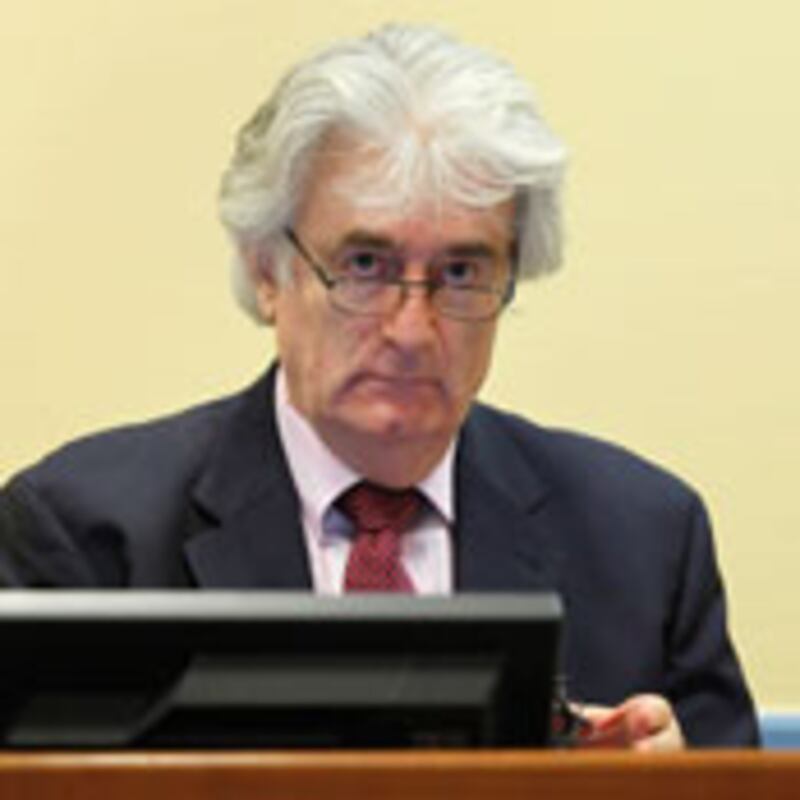
Hasan Nuhanovic will not be attending Radovan Karadzic's trial.
It's not just that The Hague is fairly far away and expensive to reach from Sarajevo. The 41-year-old translator who interpreted for Dutch U.N. troops in Srebrenica in 1995 has things to do: there's work, tending to his 12-year-old daughter, and trying to put the men he thinks killed his mother behind bars. In other words, there's normal life, or some semblance of it—perhaps the best unintended revenge on someone like Karadzic who, as leader of the Bosnian Serbs during the Bosnian war in the early 1990s, is charged with violently, even genocidally, trying to rid large swaths of Bosnia of its non-Serbs forever.
"I know it's a very difficult subject, but we are actually informed how many bones of the skeleton, and which ones, were recovered. And then we are asked whether or not we want these remains to be buried on the next July 11."
For Nuhanovic, the thought of a "normal" life must have seemed impossibly remote in the summer of 1995. On the afternoon of July 13, he watched as his father, mother and brother, like thousands of other Bosnians who had sought protection at the U.N. compound in Potočari, were thrown off the Dutch base and handed over to waiting Serb forces, like lambs to the slaughter. "It happened in front of my eyes," says Nuhanovic, who was allowed to remain at the base because he was a U.N. employee. "The Dutch said, 'You can stay but your family cannot.' I knew when they walked out they were going to be killed. I mean, everybody knew that, okay?"
He never saw them again.
Some 8,000 Muslim men and boys were murdered over the course of one week that July in what this Tribunal has already ruled a genocide. For years Nuhanovic made it his mission to find out the details of what happened to his family. The "mortal remains" of his father, as Hassan calls them, were found in a secondary grave site some 50 kilometers from Srebrenica, although Hasan didn't know anything about it until 2002, when they were finally identified through DNA testing. He buried what remained of his father in the Srebrenica memorial-cemetery complex in Potočari a few years back, where relatives of victims have the chance to lay their murdered loved ones to rest every July 11, the infamous anniversary of the enclave's takeover by Bosnian Serbs. Mass murders, mass graves, mass—or at least collective—burials.
Hasan's brother has yet to be found, or at least indentified. As for his mother, for years he thought she committed suicide in a prison near their hometown of Vlasenica a few days after being forcibly separated from her husband and son—death by broken bottle to avoid being raped by Serb soldiers. That was before an exhumation team found his mother's remains and was finally able to identify them just this past summer. The bones told a different story: she was executed along with five or six men in a ravine near Vlasenica. Hasan says that account matches that of the man who told him he was an eyewitness to the execution. Hasan says he's heard the ravine was used as a garbage dump by the locals for years; few remains have survived.
Which is where Hassan's dilemma—shared by thousands of others like him—comes in. "I know it's a very difficult subject," he tells me, "but we are actually informed how many bones of the skeleton, and which ones, were recovered. And then we are asked whether or not we want these remains to be buried on the next July 11."
It's a gut-wrenching choice. "For example, my cousin's remains were found a couple of years ago, but it was only his skull," relates Hasan. "So my uncle didn't know what to do for years. He was hoping the rest of the body was going to be recovered. Finally he decided to bury the skull only. My mother's case is quite similar."
Hasan has decided to bury what's left of his mother this July, which is not much more than her skull. "I'm not going to wait for the teams to recover more of it," he says, all the more so since her body was burned (after she was executed and not before, Hasan hopes, although he doesn't know for sure).
It's a story you hear repeated in the cavernous halls of the International Criminal Tribunal for the Former Yugoslavia and whispered softly in the public gallery of Courtroom One, where Karadzic sits on the other side of the bullet-proof glass.
(As of this writing, the trial is at a halt, postponed for the second time since it began in October. Judges at the International Criminal Tribunal for the Former Yugoslavia say they'll wait for an appeals chamber decision on whether to grant Karadzic more time to prepare his defense before hearing witnesses. The ruling came at the close of two days of opening arguments by Karadzic, who said he'll prove in court that it was the Bosnian Muslims—and not the Serbs as prosecutors allege—who led the country to war by trying to create an Islamic state with the backing of the West.)
Hatidza Mehmedovic, who heads of the Mothers of Srebrenica group, made the trip to The Hague to see Karadzic in the dock. She listened to what he had to say in his opening statement, calling it "a crime upon a crime." But what she wanted to speak about were her two young sons. Investigators have found some of their bones; they just don't know which son the bones belong to. She won't bury them at Potočari until she finds out.
"What they created there was a place of worship—it's a myth again," Karadzic told the court, disputing the number of deaths. He said if more than 8,000 men had been killed there, why did the Muslims only manage to bury 2,500? "We know to this day that graves are being exhumed all over Bosnia-Herzegovina so somebody can be buried in July in Srebrenica," he continued. "Of course the death of a single person is significant. But then why exaggerate?"
That Karadzic is finally behind bars after being "on the run" for over a decade while enjoying a new life and somewhat successful career as his alter-ego Dragan Dabic, the alternative health healer, is no doubt comforting to many survivors who saw their chance of convicting the architects of the war slip away with the premature death of Yugoslav President Slobodan Milosevic during the course of his trial here in 2006.
But to Hasan Nuhanovic, justice means getting the so-called little fish. "There is no personal connection between me and Karadzic," he says. "He's just a stranger, someone I saw on TV so many times, a scary person."
His trial will be one for the history books, says Hasan, although whether any Bosnian Serbs will accept what the Tribunal one day rules as fact is doubtful.
Justice, Nuhanovic-style, is personal: seeing the former commander of Vlasenica's police station, who Hasan says gave the order to murder his mother and today works for the Ministry of Security in the same city where Hasan lives, behind bars; a prison sentence for Goran Bastah, the convict who Hasan thinks pulled the trigger and then doused his mother with gasoline before setting her on fire; the arrival in The Hague of the fugitive General Ratko Mladic, the military leader of the Bosnian Serbs, who was filmed "negotiating" with Hasan's father a day or two before his execution; and recognition by the Dutch state, which Hasan is suing for "gross negligence and torte," for the actions of its peacekeepers almost 15 years ago: "handing over my family to their enemy, who killed them."
Now that Hasan is close to burying his mother's remains, there's a sense of relief, he says: "a grave where you can go and spend a couple minutes, say a prayer." But there will never be closure.
"The perpetrators of these horrible crimes still live in our neighborhood. How can you have any closure knowing that the killers, or many of them, will actually never be prosecuted, arrested or put behind bars?" The professional translator can't even find a word for "closure."
"There is no such word in our language," he says. He of course knows what it means. It simply doesn't translate.
Freelance journalist Lauren Comiteau has covered the International Criminal Tribunal for the former Yugoslavia and other stories from the Netherlands for Time magazine, CBS Radio, CBC, VOA, The Chicago Tribune and others since 1996. Her most recent gig was as deputy editor of Time Out Amsterdam, where she wrote the family issues column "Domestic Blitz."





